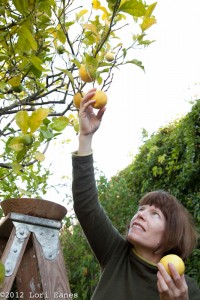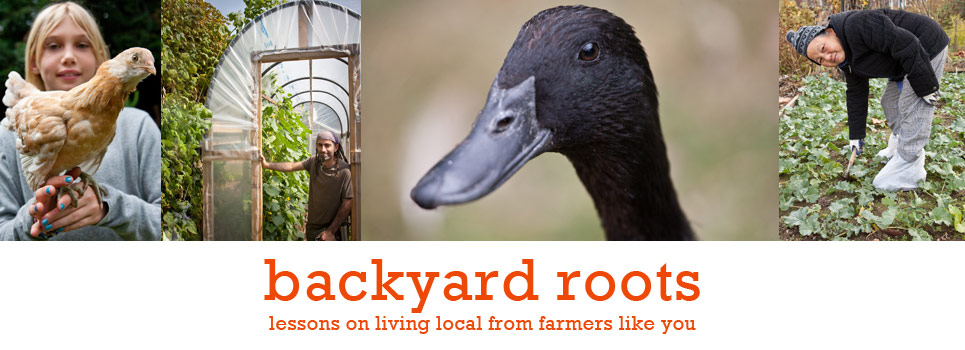Way back in 2010, I began photographing urban farmers. The economy was bad and I needed a project. As a food photographer I’ve always had plenty of interest in food and was already obsessively reading about it. When I heard about people raising chickens, ducks, rabbits and goats as well as vegetables in their backyards I had to meet them.
This project that began with curiosity became something more when I began learning from the farmers. Their ideas kept me going. It’s fun to see what people do in their backyards and you can learn a lot from them. As I turned my project into a book, I photographed over 75 backyard farms and I’m still visiting more. The blog is a way to share what I’ve found. It still inspires me and I’m hoping other people will be inspired too. Growing edibles is a creative and fulfilling way to lessen our carbon imprint and connect with nature. Not to mention the tasty food.
——————————————————
 Lori Eanes is a San Francisco based food and people photographer. Her work has appeared in cookbooks such as One Bite at a Time (Celestial Arts) and Hot Chocolate (Ten Speed Press), and in publications such as Sierra, the Wall Street Journal, Oakland Magazine and San Francisco Magazine. She grows her own vegetables in San Francisco.
Lori Eanes is a San Francisco based food and people photographer. Her work has appeared in cookbooks such as One Bite at a Time (Celestial Arts) and Hot Chocolate (Ten Speed Press), and in publications such as Sierra, the Wall Street Journal, Oakland Magazine and San Francisco Magazine. She grows her own vegetables in San Francisco.
Find more work on her website: www.lorieanes.com
Have a question, comment, or just need to chat? Contact Lori

Hello Connie,
Allow me to introduce myself,
My name is Sean and I along with my podcast Partner, Tony Hair, are the creators of The Portland Sustainability Podcast.
The Portland Sustainability Podcast is dedicated to providing information about sustainability and waste reduction in the Portland area.
We were referred to you by Betty Shelly of Reduce Your Waste Project.
We would like to interview you on the podcast about your work with Permaculture.
We feel that you have a great and compelling story that people would get a lot of value from hearing about.
If you would be interested in doing an interview we would need about 60 minutes of your time to record a 40 to 45 minute interview.
We record our interviews via Skype so you can do it from the comfort of your home (or where ever is most convenient for you).
We always record on Tuesday evenings from 6:30 to 8:30.
If this time is not available for you we are glad to work around your schedule.
Here is a link to the website where the podcast lives:
http://www.portlandsustainability.com/
Feel free to check it out if you’re interested.
You can also find The Portland Sustainability Podcast on iTunes and Stitcher.com
We really hope that you would be interested in doing an interview, Connie.
Again, we feel that you have a great story that people would love to hear.
Thank you for your time and consideration.
We appreciate it.
Best regards,
~ Sean
The Portland Sustainability Podcast
This message is for Connie Van Dyke, who narrates the video clip “Tabor Tilth.”
Dear Connie–
I LOVED your YouTube clip, and would love to visit your site in Portland some time!
Some introduction: My name is Tom Ellis, and I am a retired English professor, now living in Salem, OR. I first caught the Permaculture bug, so to speak, a few years ago when I stumbled on Geoff Lawton’s video clip entitled “Greening the Desert.” I was hooked! And since then, I’ve read and watched everything I could find about permaculture. When I retired in 2017 and my wife and I moved from Norfolk, VA to Salem OR, I immediately enrolled in the Master Gardeners program, and am now a certified Master Gardener (though still a beginner in actuality, having come here as a head-tripping scholar who knew nothing about gardening).
I also completed Andrew Millison’s Permaculture Design Certification course at OSU last fall, and I have started transforming my 1/3 acre suburban lot into a permaculture garden, now including a contour swale, herb spiral, rainwater catchment, native pollinator flowers and shrubs, and lots of homegrown mulch and compost. But from seeing your film, you are way far ahead of me on all of this!
I would like to get in touch with you some time to see about inviting you down here to Salem for a Master Gardeners-sponsored lecture/presentation on your permaculture activities, since I was deeply impressed with how many permaculture principles you have incorporated in your small urban garden!
My contact info is as follows:
Thomas I. Ellis
4553 Fir Dell Dr SE
Salem, OR 97302
(971) 701-6965 (H)
503-385-5594 (C)
tiellis@gmail.com
Best wishes,
Tom
PS: You might be interested in the response I just posted to one of your viewers who objected to your line about not eating your pets but eating their babies:
———————-
Thomas Ellis
1 second ago
Unless you are an ideological vegetarian, I see no problem here. All life feeds on other life, both animal and plant (and humans, like other apes, have an omnivore’s metabolism). Homegrown rabbit meat is a whole lot better for our bodies, our communities, and our planet than corporate beef or chicken shipped in from China or Mexico.
The distinction that Connie Van Dyke is making here is subtle but important. Like all other animals, we distinguish between those fellow creatures we treat empathetically (i.e. our children, our friends, or our pets) and those we treat instrumentally (e.g. livestock, fish, crustaceans, and snails). Where we draw the line between empathetic and instrumental relationships is culturally relative; Tibetans, despite their profound culture of enlightenment and compassion for all living beings, eat yak, because in their high, dry regions, they cannot otherwise get the protein they need from their bioregion.
And permaculture–above all–is pragmatic. This is one important way it differs from food or garden cults. It recognizes that morality is a continuum–not black and white–and the ethical value of any decision depends on context. There are no moral absolutes, but rather three asymptotic goals: Earth Care, People Share, and Fair Share. So I fully understand and appreciate Connie’s ethical distinction between not eating pets (empathetic relationship) and eating their babies (instrumental relationship)–despite some folks’ squeamishness about this.